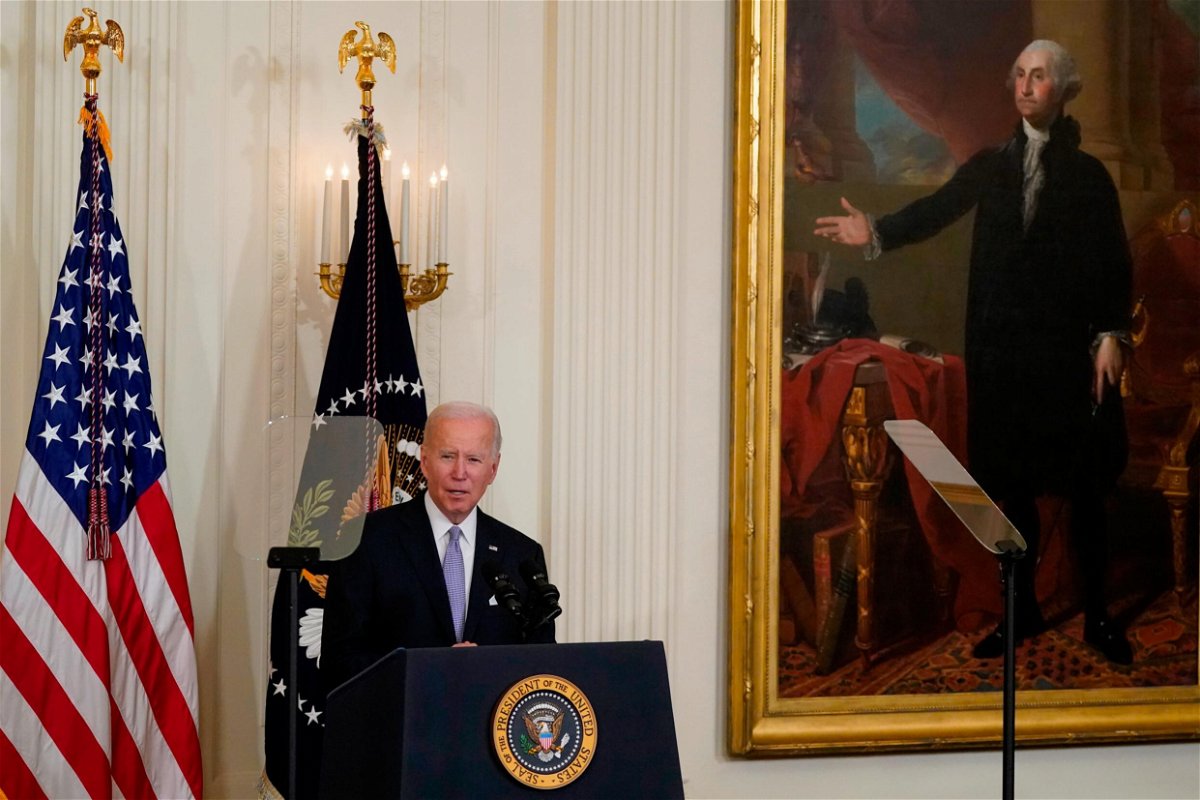Biden nears decision on student loans as inflation worries mount

Top White House aides have drafted the order for canceling some student loan debt
By Edward-Isaac Dovere, CNN
Top White House aides have drafted the order for canceling some student loan debt, but they’re still waiting for President Joe Biden to make up his mind on whether to go forward with it.
A pair of commencement speeches scheduled for this weekend might seem like a perfect setting for an announcement, but White House aides expect that the President will only touch on the subject then. The aides are still expecting that a final decision will take more time.
For months, internal conversations have circled around whether the President actually has the legal authority to unilaterally cancel loans, not to mention Biden’s own continuing skepticism that canceling loans violates principles forged as a pre-Baby Boomer representing a state that’s the homeland of consumer debt.
Biden and aides have also long been worried that the right answer to Republican attacks that Democrats are all about government handouts and catering to elites isn’t to be seen as handing out money to the most highly educated. That’s what’s led them to eye a $125,000 annual income limit for forgiveness, believing that limit is both in line with the progressive income tax model and good politics.
In recent weeks, though, people involved tell CNN that nearly every internal conversation about what to do has eventually turned to asking if canceling the debt will feed inflation just at the moment when Democrats are hoping the rates will start to tick down ahead of the midterms. After spending much of 2021 worried that they weren’t going big enough in the face of the crisis, the economic situation — including the threat of tipping into a recession by next year — has Biden and his inner circle nervous about going any bigger at all.
Forces inside and outside the White House are urging Biden to announce his cancellation decision jointly with what is expected to be an end to the moratorium on student loan payments, which was started during the pandemic under the Trump administration and, after two Biden extensions, is set to expire on August 31. The goal is to make the dual announcement by early summer so that borrowers can prepare.
Outside the White House, multiple Democrats involved see a familiar Biden pattern playing out again: Letting himself be defined by the long and tortured process rather than the end result, while agreeing to a priority of his party’s liberal wing but with a compromise that feeds complaints that his heart’s not really in it. In a midterm environment where Democrats could use all the help they could get, they say, Biden’s wavering is sapping himself of whatever political benefit he could get, particularly among younger and Black voters who would statistically benefit the most from forgiveness and whose enthusiasm for Democrats has plummeted.
“Every day that he drags on — he may end up doing the right thing and not getting the appropriate credit,” said Rep. Ro Khanna, a California Democrat who was a co-chair of Sen. Bernie Sanders’ 2020 presidential campaign and says progressives need to accept a middle ground on this issue. “If he announces it, and says ‘I’m doing it,’ he looks decisive and gets the political credit.”
Progressives warn of disappointment
Some progressive leaders, sensing they’re not going to get all they want, are already gearing up to voice their disappointment, even if Biden goes with a final decision that would be higher than the $10,000 in forgiveness he promised to support during the 2020 campaign.
Some are still pushing for as much as $50,000 in relief, though few involved in discussions have ever believed that was possible. Instead, they’ve been pushing back against any income-level means test, arguing that could cut out thousands of deserving borrowers who either don’t receive the benefit because of government bureaucracy, or who racked up hundreds of thousands of dollars in loans that they’re still buckling under despite higher salaries now.
“The longer the administration waits — apparently because they are figuring out how many people to exclude from a cancelation program — the less appreciative people are going to be, because they’re continuing to struggle this entire time,” said Rep. Mondaire Jones, a progressive Democrat from New York who spoke about student debt cancellation with Biden during a meeting in the White House’s Roosevelt Room last month.
But Jones said he could be satisfied with $10,000 in forgiveness, arguing that this could be pitched as money that’s offsetting inflationary increases in other spending that borrowers have had to worry about.
“People will feel a material improvement in their lives with $10,000 or more in debt relief — that’s $10,000 or more that they would not have had but for the President’s cancellation,” he said.
Close as Biden seems to making an announcement, the conversations have still been caught up, in part, by the basics.
Part of Biden’s meeting with Senate Majority Leader Chuck Schumer and Sens. Elizabeth Warren and Raphael Warnock at the White House last week was consumed by them making the case again that he needs to think more broadly about how many, and what sort of, people would be affected by forgiveness.
In conversations with Biden and top aides like White House chief of staff Ron Klain, Warren’s favorite statistics include stressing that only 2% of Harvard students graduate with debt but half do at the University of Delaware — which just happens to be the President’s alma mater and one of the schools he’ll be addressing this weekend.
She’ll point out that 91% of students at historically Black colleges and universities graduate with loans. She’ll point out how many people have student debt who never even finished enough courses to complete their degrees, and the disproportionate racial breakdown that, by her numbers, have just 6% of White borrowers still paying off loans after 20 years, compared to 96% of Black borrowers.
There’s a direct political ramification of how many people the forgiveness can touch depending on whether Biden lands at $10,000, $20,000 or higher, Warren stresses. And as for the argument that canceling by executive authority could be challenged in court, she argues that the government is the holder of the contracts, so Republicans or other opponents to the move would have to find someone to say he or she was harmed in order to sue to stop the move.
Jones, Warren and others have repeatedly pointed out to the White House that Biden used his authority to defer payments and no Republicans sued over that.
Warnock — trying to hold onto his Senate seat in Georgia in the fall — centered his argument to Biden on who in Georgia would be included in forgiveness, telling the President about all the people who talk to him after Sunday services at his home church in Atlanta.
Inflation looms over the decision
Other leaders on the Hill have been trying to calibrate pressure on the White House. Massachusetts Rep. Ayanna Pressley, while not part of the conversation with Biden last week, spent her time whipping support for a letter from the full Congressional Black Caucus timed to the meeting declaring that “the student loan debt crisis is a racial and economic justice issue disproportionately impacting Black communities across the nation.”
While the CBC letter didn’t include a specific number, Pressley has been clear about what she would consider acceptable, saying that $10,000 per borrower would barely cover interest for some of the most burdened borrowers, and that the approximately $250 billion cumulatively that would cover would be a drop in the bucket compared to the $2 trillion in student debt in America.
Inflation anxiety is circulating among progressives as well.
“He should cancel all of it. The problem is inflation might shoot up because we don’t yet have guardrails in place for price gouging,” said New York Rep. Jamaal Bowman.
Reflecting some of the wariness among Democratic moderates in his chamber about cancellation, Schumer has not called a show vote on the issue, despite attending the latest White House meeting and repeatedly calling for Biden to make the move.
Biden pressured to act
White House aides have been having trouble lately concealing their own tedium at telling reporters over and over that there’s still no decision on the issue.
A White House spokesperson reiterated that Biden’s extending the moratorium on payments means that for 41 million borrowers, “no one has been required to pay a single dime of student loans since the President took office,” with $18.5 billion in targeted debt relief to more than 750,000 borrowers who meet the requirements of the Public Service Loan Forgiveness program.
Aides are sensitive to the idea that Biden is seen as having promised to eliminate debt while on the campaign trail, even though his statement then was just that he was in favor of doing so — not that he’d do it himself. The spokesperson added, “The President continues to support forgiveness of $10,000 through congressional action.”
But with the midterms looming and not much faith among Democrats in the White House or beyond for more wins in Congress between now and the fall, operatives are pressing Biden to move where he can.
Data for Progress, a progressive polling firm, has found wide support for cancellation — but not a significant difference between canceling $10,000 and $50,000 among Democrats. It’s not that there are likely many single-issue student debt voters, said the firm’s political director, Marcela Mulholland. Instead, it’s an issue for enthusiasm.
“It’s really clear that we need to be delivering tangible, real wins for our base,” Mulholland said. “The way the administration has gone about it so far, of being lukewarm and flip-floppy, has meant that the people who are against forgiveness are upset that student loan payments haven’t been resumed, and the people who want student debt (forgiveness) are disappointed he hasn’t done it.”
For many Democrats outside the progressive wing of the party, that’s not the only problem.
“We’re on a path to 30% approval if the White House keeps up this pretense that Covid is over at the border but not for people with college debt,” said one Democratic strategist involved in multiple midterm campaigns, referring first to the administration trying to push back against ending the Title 42 pandemic restrictions on immigration. “Voters know when Covid is being used as cover for policy wish fulfillment.”
For all the insider focus on the process so far, Mulholland argued that Biden still has an opportunity to capitalize on the overwhelming majority of voters who never tune into the Washington back-and-forth.
“What makes it into most voters’ consciousness,” Mulholland said, “is the decision at the end of the day: ‘Do I have to make my student loan payments or not?'”
The-CNN-Wire
™ & © 2022 Cable News Network, Inc., a WarnerMedia Company. All rights reserved.



